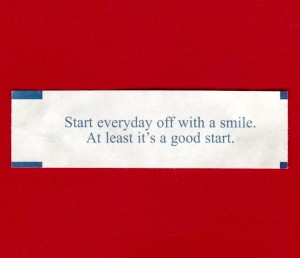Fortune Cookie Friday: Start With a Smile
How many of you wake up in the morning to the sound of your alarm clock? How many hit the snooze button and roll back over, hoping that a few more minutes of rest will make you feel better? Maybe you can do better. Smile.
Look again at the lead picture for this post, that cute little jellybean grinning back at you. There, I’m sure you are smiling now. If not, I hope to change your expression by the end of this article.

There has been a lot of research on smiling. The simple act of turning up the corners of your mouth, lifting your cheeks, and wrinkling your eyes can have a profound effect on you and others.

Smile for You
Smiling activates the release of substances that make you feel better. It can release chemicals like neuropeptides, that aid in fighting off stress1 and neurotransmitters that relax your body. They can even lower your heart rate and blood pressure. Some of the neurotransmitters released when you smile are dopamine, endorphins, and serotonin.
The endorphins work like a natural pain reliever. You will feel less aches and pains without the negative side effects of synthetic, over the counter medicine. Serotonin is your body’s pick-me-up or anti-depressant, but again without the side effects of a pill.

Then there’s dopamine, this helps control the brain’s reward center. Imagine you turn on the radio and hear your favorite song. A signal travels from your brain to your facial muscles, causing you to smile. That smile is not the end of the story.
You enjoy the song, and probably sing along with it, but the smile contracts the muscles in your face. The muscle contraction sends a signal back to the brain where you release dopamine. This stimulates the reward center and you get a big mental gold star. Your brain feels good and tells you to smile; you smile and tell your brain it feels good, and so on and so forth.

Even a forced smile can make you feel better2. Using that same cycle as before, you can contract the muscles in your face and give yourself a happy feeling. Some studies3 even found that saying vowel sounds that force your facial muscles into a “smile” position could make you feel better. The long “e” sound stretches the corners of the mouth, similar to a smile. Maybe that is the reason why some words sound pleasant, like baby, candy, or puppy.

Smile for Others
Just like a yawn, your smile is contagious. The cingulate cortex, an unconscious automatic response area of the brain1, is responsible for the facial expression of your smile. It is also responsible for mimicking another’s smile. When you see a smile, you will mimic it.
When you smile at someone, they can’t help but smile back. In fact, it takes a conscious effort not to smile back. If you can make them smile, you can start that same feel-good neurotransmitter release in them.

Think of how happy you could feel if you woke up each morning with a smile. Consider the fact that you could brighten the day of any number of people if you simply smiled at them. I placed smiling faces throughout this article. My hope was that by the time you reached the end, you would be smiling too. You have heard that exercise is a great way to make yourself feel good. Well, get those facial muscles moving and start with a smile. 🙂
I’ve even included some music to work out with. Press play and sit back and SMILE.
Citations:
- Riggio, Ronald E.,D., Sarah Stevenson. “There’s Magic In Your Smile – How Smiling Affects Your Brain” June 25, 2012 PsychologyToday.com https://www.psychologytoday.com/blog/cutting-edge-leadership/201206/there-s-magic-in-your-smile February 3, 2016
- Abrams, Lindsay. “Study: Forcing a Smile Genuinely Decreases Stress” June 31, 2012 The Atlantic.com http://www.theatlantic.com/health/archive/2012/07/study-forcing-a-smile-genuinely-decreases-stress/260513/ February 3, 2016
- Layton, Julia. “Does smiling make you happy?” June 3, 2009 HowStuffWorks.com http://science.howstuffworks.com/life/smiling-happy.htm February 3, 2016




